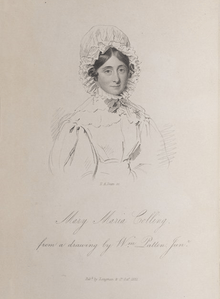Mary Colling
Mary Colling or Mary Maria Colling (20 August 1804– 6 August 1853) was a British poet, domestic servant.
Mary Colling | |
|---|---|
 Portrait included in her book of poetry, by Thomas Anthony Dean | |
| Born | 1804 |
| Died | 1853 Tavistock |
| Nationality | British |
Biography
She was born Mary Maria Colling on 20 August 1804 to Edmund Colling and Anne, née Domville in Tavistock, Devon. Her father was husbandman and assistant to the surveyor of the highways and she was baptised on 2 September 1804. She was educated locally from the age of ten, at a dame-school where she learned to read and write and do needlework. She got a position when she was fourteen as a lady's maid. She drew the attention of Anna Eliza Bray in 1831 and shared her poems, one inspired around 1825 by Rev. Edward Atkyns Bray on hearing him preach about "power of God manifested in the creation of the world". Bray assisted her in getting her work published and considered her a friend though the vast difference between their classes at the time prevented a closer relationship and when later publishing her letters Bray edited them to remove the specific reference to Colling as her friend though keeping in her admiration of her. Her only book of poems published was Fables and other Pieces in Verse which included the teaching of values and descriptions of rural life. Bray shared her discovery of this poet with Robert Southey, poet laureate. Colling developed medical issues later and spent time in an asylum. She lived with her parents in Tavistock and died of dropsy aged only forty eight, on 6 August 1853.[1][2][3][4][5][6][7][8][9]
References and sources
- Obey, Erica (2010). ""The Poor Girl's Talent": Romantic Mentorship and Mary Colling's "Fables"". Keats-Shelley Journal. 59: 65–77. JSTOR 41409531.
- "Mary Maria Colling © Orlando Project". Orlando. Retrieved 2020-01-20.
- "Colling, Mary Maria (1804–1853), poet and domestic servant | Oxford Dictionary of National Biography". www.oxforddnb.com. doi:10.1093/ref:odnb/9780198614128.001.0001 (inactive 2020-01-29).
- "Will of Mary Maria Colling, Spinster of Tavistock , Devon". The National Archives. 2008-12-18. Retrieved 2020-01-20.
- The Gentleman's Magazine, and Historical Chronicle. E. Cave. 1831. p. 534. Retrieved 2020-01-20.
- The London and Paris Observer. Or Chronicle of Literature, Science, and the Fine Arts. Galignani. 1832. p. 25. Retrieved 2020-01-20.
- "The" Athenaeum: Journal of Literature, Science, the Fine Arts, Music and the Drama. Francis. 1831. p. 762. Retrieved 2020-01-20.
- Gifford, W.; Coleridge, J.T.; Lockhart, J.G.; Murray, J.; Elwin, W.; Macpherson, W.; Smith, W.; Ernle, R.E.P.B.; Prothero, G.W. (1832). The Quarterly Review. John Murray. p. 80. Retrieved 2020-01-20.
- "MARY COLLING'S POETRY. » 14 Jan 1832 » The Spectator Archive". The Spectator Archive. 2019-11-02. Retrieved 2020-01-20.